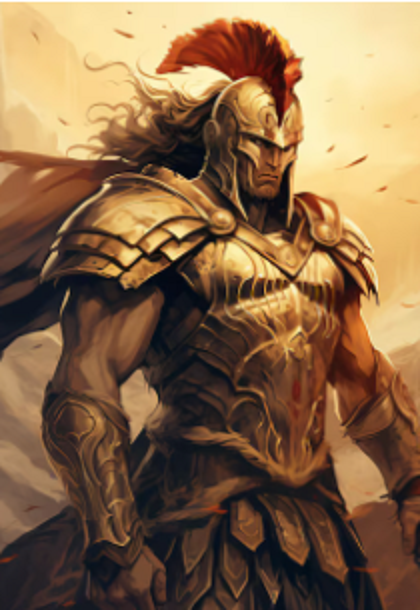Ares

Ares: The Fierce God of War in Greek Mythology
Ares, the Greek god of war, is one of the most controversial and least beloved deities in the pantheon. Known for his aggressive and tumultuous nature, Ares embodies the chaotic and violent aspects of conflict. Despite his unpopularity among gods and humans alike, Ares plays a crucial role in Greek mythology, symbolizing the brutal and often uncontrollable force of war.
Origins and Mythological Background
Ares is one of the twelve Olympian gods and the son of Zeus, the king of the gods, and Hera, the queen of the gods. Unlike his more strategic and revered counterpart, Athena, who represents military strategy and wisdom, Ares personifies the sheer physicality and bloodlust of battle. His origins are deeply rooted in ancient Greek beliefs about the nature of war and its impact on human life.
Ares's mythological narrative is filled with tales of his exploits and battles, often highlighting his impulsive and destructive tendencies. He is frequently depicted as a handsome but vain and cruel god, always eager for conflict and bloodshed.
Roles and Attributes
God of War and Violence: Ares's primary domain is war, and he is the embodiment of its brutal and violent aspects. Unlike Athena, who represents the strategic and intellectual side of warfare, Ares revels in the chaos and carnage of battle. His presence on the battlefield is often associated with fear, destruction, and death.
Symbols and Iconography: Ares is commonly depicted in Greek art as a powerful warrior, often wearing a helmet and carrying a spear or sword. His armor symbolizes his martial prowess and readiness for battle. His sacred animals include the vulture and the dog, both creatures associated with death and carnage.
Companions and Offspring: Ares is often accompanied by figures that personify the horrors of war, such as Phobos (fear) and Deimos (terror), his sons with Aphrodite. He also fathers other children with Aphrodite, including Harmonia (harmony), which contrasts with his chaotic nature. This relationship highlights the complex and often contradictory aspects of Ares's character.
Worship and Cult
Despite his prominent role in mythology, Ares was not widely venerated in Greek religion. His worship was more common in regions known for their militaristic cultures, such as Sparta and Thrace. In Sparta, where war was a central aspect of society, Ares was honored as a patron of warriors, and his influence was integral to the city's identity.
Temples dedicated to Ares were relatively rare compared to those of other Olympian gods. One notable exception is the Temple of Ares in the Athenian Agora, which underscores the city's recognition of all aspects of war, despite its preference for Athena's strategic wisdom.
Festivals dedicated to Ares were also sparse, with the Spartans holding certain rites in his honor to invoke his favor before going to battle. However, the general Greek attitude towards Ares was one of caution and respect rather than affection or devotion.
Mythological Tales
Ares's mythological stories often portray him as a formidable yet flawed character. In the "Iliad," Homer depicts Ares as a powerful but reckless force on the battlefield, often thwarted by other gods who favor the Greeks or have more strategic insights. His frequent clashes with Athena in the "Iliad" highlight the contrast between brute strength and strategic warfare.
One notable myth involves Ares's affair with Aphrodite, the goddess of love. Their union, despite Aphrodite being married to Hephaestus, the god of blacksmiths, produces several children, embodying the complex interplay between love and war. The affair is famously exposed by Hephaestus, who traps the lovers in a net and humiliates them before the other gods, illustrating Ares's vulnerability and the consequences of his impulsive nature.
Another story involves Ares's imprisonment by the giants Otus and Ephialtes, who trap him in a bronze jar for over a year. This tale emphasizes Ares's fallibility and the disdain other gods and mortals often hold for him.
Cultural Legacy
Ares's legacy extends beyond ancient Greece, influencing Roman culture where he was known as Mars. Unlike Ares, Mars was a more respected and integral figure in Roman religion, symbolizing not only war but also agricultural fertility and fatherhood. This contrast highlights the differing cultural attitudes towards war and its deities in Greek and Roman societies.
In modern times, Ares remains a potent symbol of war and its destructive nature. He appears in various forms of literature, art, and popular culture, often representing the darker aspects of human conflict. His character serves as a reminder of the inherent violence and chaos of war, as well as the consequences of unchecked aggression.
Ares' Conclusion
Ares, the Greek god of war, embodies the brutal and chaotic nature of conflict. His role in mythology highlights the darker aspects of human nature and the destructive power of war. Despite his unpopularity among gods and mortals alike, Ares's enduring presence in myth and culture serves as a powerful reminder of the complexities and consequences of violence and conflict.
